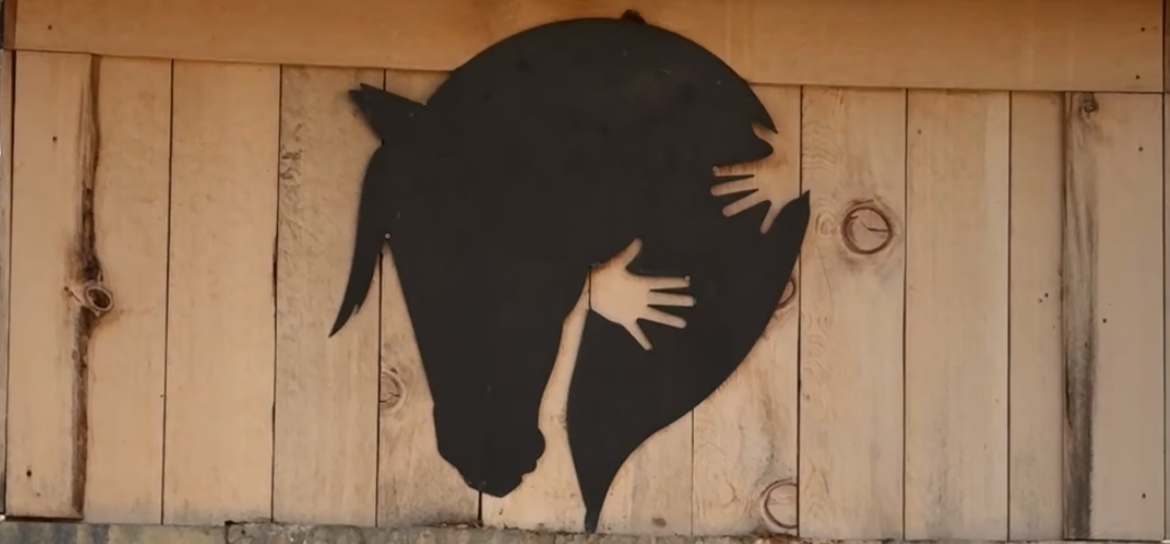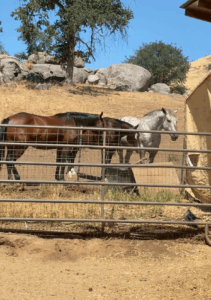
Photo by Ben Hensley | The RIDE Foundation adopted its first mustang — Monroe — in 2015, and incorporated as a nonprofit in 2017.
Written by Ben Hensley
The human connection to horses can be traced to before the completion of the Great Pyramids of Egypt, and since then, the need for an emotional, almost spiritual, connection between the four-legged beasts and humans has been at the root of the bond.
While primarily seen as a means of transportation, the bond between a horse and a human is one deep-seeded in trust — trust that Sarah Muzquiz, founder of the RIDE (Recovery in Deserving Equine) Foundation, has proven to be not only instrumental in the relationship between owner and animal, but potentially healing for both the as well.
Building trust
Muzquiz, founder of the RIDE Foundation, grew up around horses. She said it all started with one horse and a lot of patience.
Growing up on a ranch and around horses much of her adolescent life, Muzquiz underwent a major life change when working as a bartender. After giving birth to her daughter, she returned to school with the future in mind.
That future became apparent when she re-ignited her love for horses. While volunteering with a local nonprofit, she was told about a wild horse on a volunteer’s property. Loose on 50 acres, nobody had been able to approach the horse.
“Challenge accepted,” Muzquiz said. “I came out here with the intention of checking out this horse; something about the horse, the property…kind of just drew me in and I found myself here every day.”
Her daily trip to the property eventually included her daughter, then five, with both building up trust with the equine, and eventually able to ride the horse to the top of a nearby hill.
During that process, a firefighter acquaintance of Muzquiz responded to an emergency involving someone he knew. The victim did not survive, and it started a downward spiral in his life. He lost his job, marriage and entered a period of major depression.
“I would tell him, ‘Hey, you have those dogs. I’m just going to sit out at the ranch and try to get this horse to trust me. You should bring the dogs,’” she said. “Pretty soon I started bringing this firefighter and his dogs out to the ranch with me and I would go work with the horse.”

As the firefighter returned with Muzquiz, he became interested in the work going on between Muzquiz and the mustang, eventually letting his guard down enough to invite the horse to approach him.
“Through this process, he became more and more involved and more and more eager to learn about what was taking place and why the horse was responding in that way,” she said. “I noticed that it was affecting him more than just with the horse — he was becoming more approachable in public settings. He was changing.”
Muzquiz realized how much it helped him, how much it helped her and had a revelation.
It came with a challenge.
“I went out searching for the person to work for — who does this,” she said. “No one else does this. It’s a completely unique idea that isn’t done.”
Saddling up for the ride
At the core of RIDE’s philosophy is a simple but powerful truth: horses reflect the energy and emotions around them.
Working with individuals who have suffered from emotional trauma — PTSD, survivors of violent crimes, veterans — the nonprofit focuses on the “reflective” nature of a horse’s emotions, using the horse’s response triggers to help clients analyze how their actions are perceived and reacted to by others.
“Horses are basically a mirror, so whatever you’re putting out is what you’re going to get back,” Muzquiz said.
She said wild horses differentiate from raised, domesticated horses that have been provided everything their entire lives.
“The reason that we use the wild mustangs is because they’re more sensitive — they have been in that ‘fight or flight’ mode their entire life,” she added. “These [wild] horses have had to rely on their herd structure, hierarchy and survival instincts for their entire lives and generations.”
After reaching out to Buck Brannaman, one of the world’s leading horse handlers, the foundation adopted its first mustang — Monroe — in 2015.
Later that year she put together a curriculum for the budding nonprofit, working with five clients before being officially incorporated as a nonprofit in 2017.
“Just being around a horse will lower your blood pressure, your heart rate, it will stabilize your breathing,” she said. “You don’t realize the actual physical effects that horses will have — and that’s just petting a horse and being around a horse.”
The foundation works closely with several nonprofit organizations, including 22 Militia, a group that combats veteran suicide. The group would attend pop-up events with an information table and representatives, but Muzquiz said that their original outward appearance — that of hardened war veterans standing at attention — was something that could be seen as a deterrent to individuals who may otherwise show interest in the cause.
After working with RIDE Foundation to effectively relax, control their breathing and regulate emotions more effectively, 22 Militia saw a near-immediate reversal of interest at events, spreading their message with considerably more ease and spreading the work of the RIDE Foundation in the community.
“In the same way, when they’re standing at attention in their booth, nobody would come near them,” she said. “They were literally using the draw technique that we use with the horse and people were coming and walking over to their booth.”
The cost, however, is not cheap. In their first year that saw the organization help five clients, they spent around $1,200. In 2024, the RIDE Foundation expenses exceeded $180,000, assisting more than 470 clients.
Outreach and thanks
In efforts to keep providing much needed assistance to clients and continue to work with partnered organizations like Fresno State, Air Force ROTC groups, Our Heroes Dreams, 22 Militia and more, the RIDE Foundation will host a banquet dinner on June 14, thanking their donors and sharing the work they have completed in the community.
Muzquiz said that none of what RIDE has been able to accomplish over the last decade could have been done without the support of their sponsors; the event also aims to showcase some of what the nonprofit has been able to expand on thanks to their donors.
“We started here with nothing,” she said. “We’ve built [this] round pen, we’ve added this 20-person viewing deck where you can see what’s going on inside the corrals — this whole thing, all these corrals and everything we’ve done here would not be possible without the people standing behind us and supporting us here in the community.”
The banquet will take place on June 14 at the Portuguese Banquet Hall in Fresno at 5 p.m. Tickets to the event can be purchased at ridefoundation.org.








